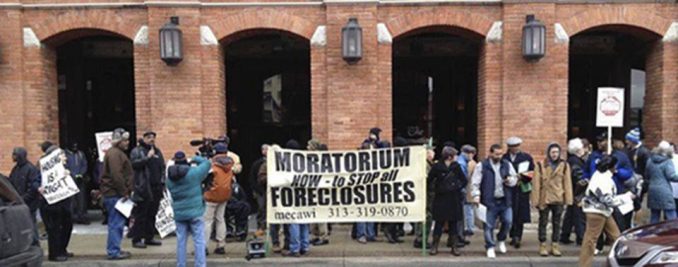Detroit against foreclosures & for housing for people, not banks
A public forum on June 17 addressed the continuing tax foreclosure crisis in Detroit that has left thousands of families facing imminent eviction from their homes. The forum was organized by the Coalition to Stop Unconstitutional Property Tax Foreclosures, composed of many community groups including the Moratorium Now! Coalition, Detroit BYP100, the Detroit People’s Platform, the United Community Housing Coalition and the American Civil Liberties Union.
Bernadette Atuahene, Wayne State University visiting law professor and coalition organizer, described the scope of the crisis. Professor Atuahene explained how between 2011 and 2015, one in four properties in Detroit was foreclosed on for unpaid property taxes by the Wayne County treasurer, a number not seen since the 1930’s depression. When you combine the effect of tax foreclosures with the 65,000 mortgage bank foreclosures that also took place, Detroit has approximately one-third fewer occupied homes now than ten years ago.
Property tax rates are calculated based on the home’s tax assessment. Atuahene pointed out that despite the Michigan Constitution explicitly providing that no property can be assessed at more than 50 percent of its market value, between 2009 and 2015, 55 to 85 percent of homes in Detroit were over-assessed. The taxes levied based on the inflated assessments on these homes and the ensuing foreclosures for unpaid taxes that occurred, were in blatant violation of the Michigan Constitution.
Predatory lending targeted Black communities
Professor Atuahene presented data showing how home property values in Detroit declined from $80,000 in 2007 to less than $20,000 in 2011, and are at around $30,000 today. This was a direct result of 65,000 bank foreclosures in the city between 2005 and 2009, when the banks targeted Detroit’s African-American residents for predatory, fraudulent, subprime and adjustable rate mortgage loans. Detroit, which formerly had the highest rate of African-American homeownership in the country, now ranks near the bottom.
After foreclosing on families’ homes, and being paid off by the government through Fannie Mae and Freddie Mac for their losses, the banks then sold the foreclosed homes at vastly reduced prices to investors. These investors further contributed to the tax foreclosure crisis by renting the properties or placing unsuspecting buyers into land contracts; not paying the property taxes; and allowing the homes to go into tax foreclosure leading to the evictions of unsuspecting occupants. A speaker at the forum, Sonya Bennett, described how this process left her family facing the loss of their home this fall.
Forum speakers also explained how tens of thousands of Detroiters were denied poverty tax exemptions which would have reduced their property tax rates anywhere from 50 percent to paying no taxes at all, when the city and county withheld information about exemption entitlements to Detroit families. A representative of the ACLU described its class action lawsuit challenging the unconstitutional tax assessments and for Fair Housing Act violations in the denial of the hardship exemptions. Monica Patrick, from We the People of Detroit, linked the fight against water shutoffs to the anti-tax foreclosure fight.
Banks benefit from federal bailout funds
The forum also discussed the denial of federal Hardest Hit Funds to homeowners to pay off delinquent property tax bills. Hardest Hit Funds are the pittance provided homeowners from the $750 billion bank bailout. The Michigan State Housing Development Authority (MSHDA), which administers the Step Forward program that distributes these federal funds, placed so many impediments to residents’ eligibility for them, they made the funds virtually inaccessible. In contrast, MSHDA turned over hundreds of millions in Hardest Hit Funds to the Detroit Land Bank to tear down homes with no oversight whatsoever, leading to massive corruption and criminal fraud investigations of the “blight removal” program.
The coalition is demanding a moratorium on tax foreclosures of occupied residences until the taxes are reassessed to their true value and hardship exemptions are provided on a retroactive basis to all families entitled to it. It is also demanding that the Step Forward regulations be rewritten to free up the Hardest Hit Funds to keep families in their homes.
Make banks pay reparations
In workshops comprised of activists and homeowners facing foreclosures, as well as families who have already lost their homes, the issue of compensation for the tens of thousands of Detroiters who have been displaced was taken up. Several workshops raised how the banks that began the housing crisis in Detroit with their fraudulent practices should be targeted with a demand for reparations for the harm they have caused. Also, that the 30,000 homes appropriated by the Detroit Land Bank from tax foreclosures be given to Detroit families in need of housing as a result of the illegal practices of both the banks, and Wayne County and city of Detroit officials.
June 28 has been designated “A Day of Action” by the Moratorium Now! Coalition. At 9:30 a.m., activists will attend the MSHDA monthly board meeting at the State of Michigan Building at Cadillac Place in Detroit to address the misuse of Hardest Hit Funds and their immediate release to families in need of aid to save their homes.
At noon on June 28, Moratorium Now! is calling for a demonstration at the Wayne County Treasurer’s Office, 400 Monroe, to demand a one-year moratorium on evictions of any families from occupied, tax foreclosed homes. June 28 is currently the last day before the tax foreclosed homes are designated for auction. Find information on the June 28 demonstrations at moratorium-mi.org. For the Coalition to Stop Unconstitutional Property Tax Foreclosures, visit illegalforeclosures.org.


